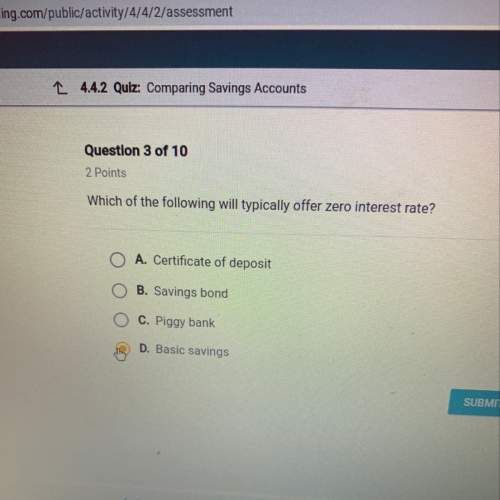
Business, 03.02.2021 17:50, VampireQueen01
Tony works as an accountant for a US-based manufacturing business. He is calculating the tax liability for his business for the previous financial year. The company’s profits for the previous financial year amount to $250,000. Which is the correct amount of corporate income tax that the business is liable to pay?
A.
$67,750
B.
$77,750
C.
$87,750
D.
$97,750

Answers: 1
Other questions on the subject: Business

Business, 22.06.2019 12:20, ohgeezy
Consider 8.5 percent swiss franc/u. s. dollar dual-currency bonds that pay $666.67 at maturity per sf1,000 of par value. it sells at par. what is the implicit sf/$ exchange rate at maturity? will the investor be better or worse off at maturity if the actual sf/$ exchange rate is sf1.35/$1.00
Answers: 2

Business, 22.06.2019 19:40, silasjob09
The martinez legal firm (mlf) recently acquired a smaller competitor, miller and associates, which specializes in issues not previously covered by mlf, such as land use and intellectual property cases. given the increase in the firm's size and complexity, it is likely that its internal transaction costs willa. decrease. b. increase. c. become external transaction costs. d. be eliminated.
Answers: 3

Business, 22.06.2019 21:40, andyboehm7411
The following items could appear on a bank reconciliation: a. outstanding checks, $670. b. deposits in transit, $1,500. c. nsf check from customer, no. 548, for $175. d. bank collection of note receivable of $800, and interest of $80. e. interest earned on bank balance, $20. f. service charge, $10. g. the business credited cash for $200. the correct amount was $2,000. h. the bank incorrectly decreased the business's by $350 for a check written by another business. classify each item as (1) an addition to the book balance, (2) a subtraction from the book balance, (3) an addition to the bank balance, or (4) a subtraction from the bank balance.
Answers: 1

Business, 23.06.2019 00:40, pleasehelp5334me2
Oliver queen buys 100 shares of stock in green arrow archery corporation, a publicly traded company with which he is not affiliated as a director, officer, or employee. he then sells his 100 shares to john diggle. the sec sues oliver because he didn't register the sale of stock to john. who wins? oliver, because the sale falls into the nonissuer exemption oliver, because the sale falls into the private placement exemption the sec, because the transaction is not exempt from registration the sec, because even exempt transactions must be registered with the sec
Answers: 3
Do you know the correct answer?
Tony works as an accountant for a US-based manufacturing business. He is calculating the tax liabili...
Questions in other subjects:

Mathematics, 23.04.2021 20:20

Arts, 23.04.2021 20:20

German, 23.04.2021 20:20


History, 23.04.2021 20:20

History, 23.04.2021 20:20

History, 23.04.2021 20:20



English, 23.04.2021 20:20







